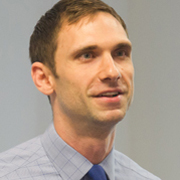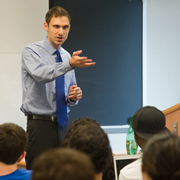
Professor Patrick Roberts (IPJ 95) is the latest alumnus to join the TFAS faculty. He is welcomed by ICPES Professor Gary Armstrong (E 84), CS and ICPES Professor Karen Czarnecki (ICPES 88) and IIPES Professor Faten Ghosn (IIPES 99).
Roberts is an assistant professor for the Center for Public Administration and Policy at Virginia Polytechnic Institute and State University. He spent the past year as a Ghaemian scholar-in-residence at the Heidelberg Center for American Studies in Heidelberg, Germany. This summer, He is teaching Transformation of American Politics to ICPES students.

Roberts on teaching TFAS students:
Q: How did you learn about TFAS? What initially drew you in?
A: I attended TFAS as a student, and I still remember that summer vividly. I jumped at the opportunity to teach a TFAS course.
Q: Why do you think TFAS is important? Do you think it can have an impact on the world?
A: I think TFAS gives students a taste of the Washington policy world. Students may wind up hooked and return to Washington after graduation, or they may go on to careers in professions in their home states but remain politically informed. Either way, the combination of focused coursework, Washington up-close internships and lectures by leading lights creates informed students. Informed students become informed leaders.
Q: What is the most significant lesson you teach your TFAS students?
A: I teach a course on the American political tradition. I show students how they are part of that tradition – either as citizens of the United States, or as citizens of other countries, where they are part of their own evolving traditions. In the first couple of classes, we discuss how the United States is not founded on a proposition that all men are created equal, but on a dedication to that proposition. We the living must take responsibility for the Constitution’s preservation.
Q: What do you most appreciate about TFAS?
A: I appreciate the intensity of the program, the commitment of the staff and, finally, the endurance of TFAS over many years.
Q: How would you like to see TFAS grow or evolve?
A: I think it’s very exciting that TFAS welcomes international students. After teaching in Germany for the past year, I know how hungry many people around the world are for insight into how Washington works and how the American political tradition evolved.
Q: What else are you working on?
A: I’m finishing a book manuscript on the history of state response to disaster in America, from the founding to the present. I’m also working on various projects related to disaster and security organizations, and on political appointees in the United States.
My empirical research focuses on the development of disaster and security organizations and their capacity, structure and degree of autonomy, or ability to develop and pursue a perspective independent of the will of politicians and interests. The nurturing and development of agency autonomy requires skills to network and collaborate as well as the skills to resist pressures during times of emergency to focus on short-term fixes. In the American context, disaster and security organizations operate with Madisonian limits on state power. Despite these limitations, public organizations can exercise a degree of autonomy and bring expertise to bear upon the political system, an insight that extends work on the policy process and agency management in the fields of public administration and policy.
Roberts on his TFAS student experience:
Q: Which program did you attend?
A: I attended IPJ.
Q: What did you learn?
A: TFAS was eye opening. I grew up in a small town in Texas, and TFAS gave me a taste of how serious people grapple with national and global policy problems.
Q: How did it affect your life/career?
A: I knew I wanted to be involved in public affairs, and I worked as a journalist for the Associated Press after college. My journalism internship and training during my TFAS summer undoubtedly helped. (I attended a “great books” style liberal arts college and never took a formal journalism class).
I remember the courses and outside lectures. I took an economics class that used one of those readers that presents both sides of an issue, and we spent the class analyzing policy problems from multiple perspectives. I think economic concepts such as rent-seeking or comparative advantage can help make sense of some policy problems.
Q: Do you have a favorite memory from the program?
A: I remember when Fred Barnes introduced himself to me as the “Beetle,” and I couldn’t stop laughing. I don’t remember exactly why this happened – I think that was his nickname on the McLaughlin Group, which was a popular political talk show at the time.
I also remember that our schedules were packed during the summer – trying to keep up in class, trying to impress our internship sponsors, attending briefings and talks around Washington as well as getting to know all the other interesting and ambitious students in TFAS for the summer. We didn’t have much time for unnecessary things like television, sleep or personal hygiene.
Q: Where did you intern?
A: I interned at AEI, as a research assistant working on public opinion issues for Karlyn Bowman and for the think tank’s magazine.
Q: Do you have any memorable experiences?
A: I met amazing people that summer. Living in the dorms across from Georgetown with the other students made for a particularly intense and intimate experience. I saw all sorts of other perspectives and insights from meeting other students, and I think that paradoxically coming to Washington made me want to see a bit more of the world too, having recognized the global reach of Washington politics and policy.
Q: Did you have a mentor?
A: We didn’t have a formal mentoring program, but Karlyn Bowman at AEI was particularly helpful and full of deep insight, though I probably didn’t show sufficient appreciation at the time! The TFAS program staff was really amazing too. I think Steve Hayes (AIPES 94) was involved in IPJ back then. I also remember having the chance to get to know former TFAS president and founder David R. Jones just a bit, and I have a deep respect for him. He was a very wise man.

